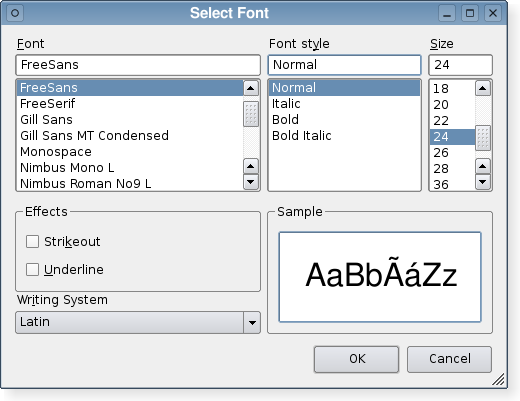QFontDialog¶

Synopsis¶
Functions¶
- def currentFont ()
- def open (receiver, member)
- def options ()
- def selectedFont ()
- def setCurrentFont (font)
- def setOption (option[, on=true])
- def setOptions (options)
- def testOption (option)
Signals¶
- def currentFontChanged (font)
- def fontSelected (font)
Detailed Description¶
The PySide.QtGui.QFontDialog class provides a dialog widget for selecting a font.
A font dialog is created through one of the static PySide.QtGui.QFontDialog.getFont() functions.
Examples:
(ok, font) = QFontDialog.getFont(QFont("Helvetica [Cronyx]", 10), self) if ok: # the user clicked OK and font is set to the font the user selected else: # the user canceled the dialog; font is set to the initial # value, in this case Helvetica [Cronyx], 10The dialog can also be used to set a widget’s font directly:
myWidget.setFont(QFontDialog.getFont(0, myWidget.font()))If the user clicks OK the font they chose will be used for myWidget, and if they click Cancel the original font is used.

See also
PySide.QtGui.QFont PySide.QtGui.QFontInfo PySide.QtGui.QFontMetrics PySide.QtGui.QColorDialog PySide.QtGui.QFileDialog PySide.QtGui.QPrintDialog Standard Dialogs Example
- class PySide.QtGui.QFontDialog([parent=None])¶
- class PySide.QtGui.QFontDialog(initial[, parent=None])
Parameters: - initial – PySide.QtGui.QFont
- parent – PySide.QtGui.QWidget
Constructs a standard font dialog.
Use PySide.QtGui.QFontDialog.setCurrentFont() to set the initial font attributes.
The parent parameter is passed to the PySide.QtGui.QDialog constructor.
See also
Constructs a standard font dialog with the given parent and specified initial color.
- PySide.QtGui.QFontDialog.FontDialogOption¶
This enum specifies various options that affect the look and feel of a font dialog.
Constant Description QFontDialog.NoButtons Don’t display OK and Cancel buttons. (Useful for “live dialogs”.) QFontDialog.DontUseNativeDialog Use Qt’s standard font dialog on the Mac instead of Apple’s native font panel. (Currently, the native dialog is never used, but this is likely to change in future Qt releases.)
- PySide.QtGui.QFontDialog.currentFont()¶
Return type: PySide.QtGui.QFont This property holds the current font of the dialog..
- PySide.QtGui.QFontDialog.currentFontChanged(font)¶
Parameters: font – PySide.QtGui.QFont
- PySide.QtGui.QFontDialog.fontSelected(font)¶
Parameters: font – PySide.QtGui.QFont
- static PySide.QtGui.QFontDialog.getFont(ok, initial, parent, title, options)¶
Parameters: - ok – PySide.QtCore.bool
- initial – PySide.QtGui.QFont
- parent – PySide.QtGui.QWidget
- title – unicode
- options – PySide.QtGui.QFontDialog.FontDialogOptions
Return type:
- static PySide.QtGui.QFontDialog.getFont(initial, parent, title)
Parameters: - initial – PySide.QtGui.QFont
- parent – PySide.QtGui.QWidget
- title – unicode
Return type: PyTuple
This is an overloaded function.
- static PySide.QtGui.QFontDialog.getFont(initial[, parent=None])
Parameters: - initial – PySide.QtGui.QFont
- parent – PySide.QtGui.QWidget
Return type: PyTuple
This is an overloaded function.
- static PySide.QtGui.QFontDialog.getFont([parent=None])
Parameters: parent – PySide.QtGui.QWidget Return type: PyTuple This is an overloaded function.
Executes a modal font dialog and returns a font.
If the user clicks OK , the selected font is returned. If the user clicks Cancel , the Qt default font is returned.
The dialog is constructed with the given parent . If the ok parameter is not-null, the value it refers to is set to true if the user clicks OK , and false if the user clicks Cancel .
Example:
(ok, font) = QFontDialog.getFont(self) if ok: # font is set to the font the user selected else: # the user canceled the dialog; font is set to the default # application font, QApplication.font()Warning
Do not delete parent during the execution of the dialog. If you want to do this, you should create the dialog yourself using one of the PySide.QtGui.QFontDialog constructors.
- PySide.QtGui.QFontDialog.open(receiver, member)¶
Parameters: - receiver – PySide.QtCore.QObject
- member – str
This is an overloaded function.
Opens the dialog and connects its PySide.QtGui.QFontDialog.fontSelected() signal to the slot specified by receiver and member .
The signal will be disconnected from the slot when the dialog is closed.
- PySide.QtGui.QFontDialog.options()¶
Return type: PySide.QtGui.QFontDialog.FontDialogOptions This property holds the various options that affect the look and feel of the dialog.
By default, all options are disabled.
Options should be set before showing the dialog. Setting them while the dialog is visible is not guaranteed to have an immediate effect on the dialog (depending on the option and on the platform).
- PySide.QtGui.QFontDialog.selectedFont()¶
Return type: PySide.QtGui.QFont Returns the font that the user selected by clicking the OK or equivalent button.
Note
This font is not always the same as the font held by the PySide.QtGui.QFontDialog.currentFont() property since the user can choose different fonts before finally selecting the one to use.
- PySide.QtGui.QFontDialog.setCurrentFont(font)¶
Parameters: font – PySide.QtGui.QFont This property holds the current font of the dialog..
- PySide.QtGui.QFontDialog.setOption(option[, on=true])¶
Parameters: - option – PySide.QtGui.QFontDialog.FontDialogOption
- on – PySide.QtCore.bool
Sets the given option to be enabled if on is true; otherwise, clears the given option .
- PySide.QtGui.QFontDialog.setOptions(options)¶
Parameters: options – PySide.QtGui.QFontDialog.FontDialogOptions This property holds the various options that affect the look and feel of the dialog.
By default, all options are disabled.
Options should be set before showing the dialog. Setting them while the dialog is visible is not guaranteed to have an immediate effect on the dialog (depending on the option and on the platform).
- PySide.QtGui.QFontDialog.testOption(option)¶
Parameters: option – PySide.QtGui.QFontDialog.FontDialogOption Return type: PySide.QtCore.bool Returns true if the given option is enabled; otherwise, returns false.




